Nigeria election 2019: Who benefits from poll delay?
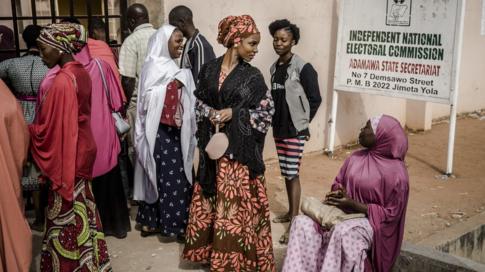 AFP
AFP
Nigeria is to hold a delayed presidential election this Saturday after the initial vote was rescheduled in a dramatic overnight press conference, five hours before polls were due to have opened.
The last-minute cancellation surprised the country and inconvenienced thousands of Nigerians who had travelled a long way to cast their votes. It has also cost the economy $1.5bn (£1.15bn), according to the Lagos Chamber of Commerce and Industry.
The Independent National Electoral Commission (Inec) has given several reasons for the delay, including attempted sabotage and logistical issues such as bad weather and problems with delivering the ballot papers.

Election in numbers
- 84 million registered voters
- 51% of the electorate under the age of 35
- 73 registered presidential candidates
- 120,000 polling stations

The governing All Progressives Congress (APC) and its main challenger, the People's Democratic Party (PDP), have both condemned the postponement and accused each other of trying to manipulate the vote.
So does the delay favour anyone?
In a statement issued on the day of the postponement, the APC alleged the PDP wanted to halt the momentum of its candidate, President Muhammadu Buhari. The PDP, whose presidential contender is Atiku Abubakar, on the other hand said Inec had delayed the election to create "the space to perfect their rigging plans".
According to Idayat Hassan, from Abuja-based think tank, the Centre for Democracy and Development, the week-long extension is too brief to have a significant influence on the result of the presidential vote.
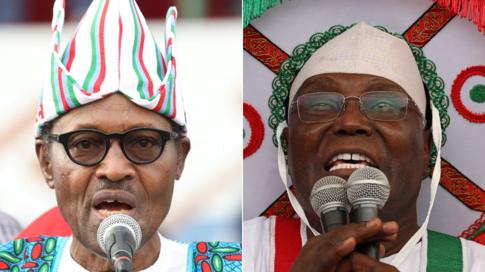 REUTERS
REUTERS
She compares the latest postponement to the one in 2015, when the PDP - in government at the time - pushed the election back by six weeks, blaming the Boko Haram insurgency in the north-east. That postponement, she says, ended up favouring the APC because it cast the PDP in a negative light - as a party that would pursue "power at all costs".
She believes this year's delay could slightly benefit the APC as it would increase voter apathy in most areas except those with historically high turnouts - "the north-west and the north-east... both strongholds of President Muhammadu Buhari".
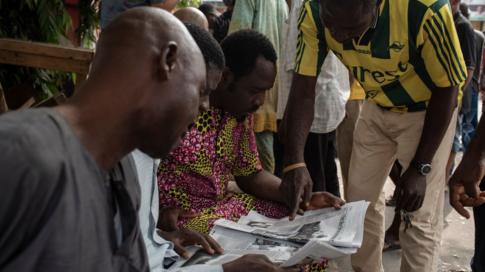 AFP
AFP
Other analysts say the postponement is likely to harm both parties equally, as their supporters who had travelled home to vote last week will be unable to make another journey this weekend.
Another view holds that the delay will harm Mr Buhari's chances, as the electoral commission's un-readiness reflects poorly on him. The commission's chief, Mahmood Yakubu, was appointed by Mr Buhari in 2015.
Will the election definitely take place this Saturday?
Inec says there will be no further delays, but some observers have questioned whether the elections will go ahead on 23 February. Festus Mogae, a former president of Botswana "It's a great deal of work yet to be done," the head of the international election observation mission said.
"I don't know whether that can be managed or not, I am not in a position to judge but it makes me apprehensive."
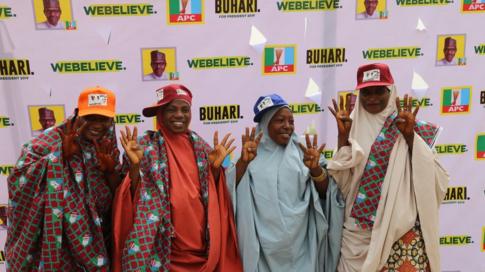 AFP
AFP
And the former vice-president of The Gambia, Fatoumata Tambajang, said she too had doubts about whether Inec could meet its new deadline.
"One has to be realistic given the enormity of the activities that are supposed to be taken care of," she said.
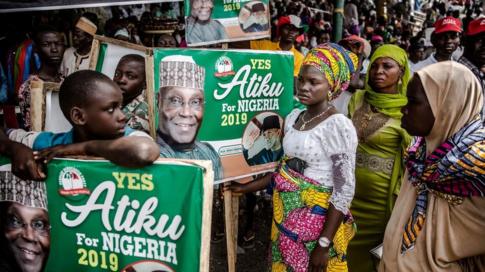 AFP
AFP
As well as overcoming logistical hurdles, she said popular enthusiasm for the electoral process would have to be restored to where it was until last week's cancellation.
What does the election commission say?
For Inec, keeping to the new date is central to maintaining the public's trust. Alhaji Yahaya Bello, the resident electoral commissioner for the capital, Abuja, told the BBC there would be "pandemonium" if election materials were not deployed in time.
"People will just think that Inec has hidden them deliberately, so we can dock some of the results," he said.
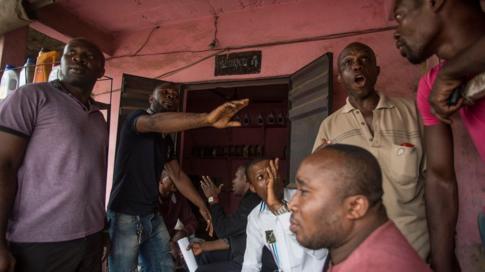 AFP
AFP
The business community has also stressed the importance of avoiding further delays, with the Lagos Chamber of Commerce and Industry warning that economic activity would not pick up until the election had been held.
What happens next?
The first task is to reconfigure some 180,000 card readers that are being used to validate voters' identity cards and check their biometric details. The dates on the readers need to be changed to the new election date.
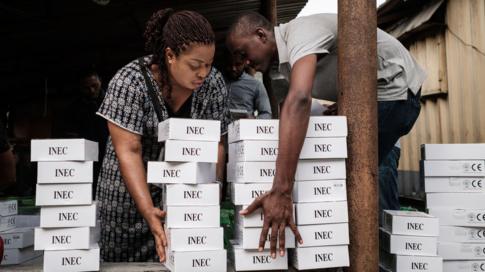 AFP
AFP
In a statement, Inec said this process would take five to six days, and is due to be completed by Thursday 21 February.
Some sensitive election materials, including ballot papers, have been returned to the Central Bank of Nigeria for safekeeping. These are scheduled to be deployed around the country by Friday 22 February, at the latest.
Election staff, including an estimated one million so-called ad-hoc staff, will also be travelling then. It is unclear what happened to the staff and volunteers, including members of the country's youth corps, that had already been deployed last Friday.
By law, all campaigning must end 24 hours before polling stations open. After initially saying that the ban imposed last week would remain in force, Inec went back on its decision on Monday, allowing political parties to resume campaigning this week.


Comments
Post a Comment